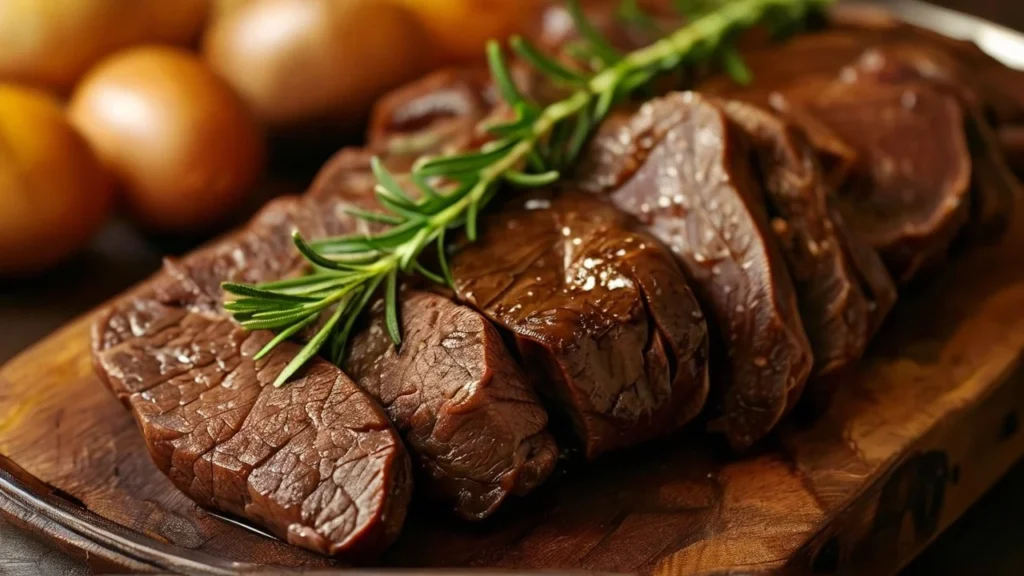Is Beef Liver Good for Weight Loss?
Key Takeaways
- Beef liver is nutrient-dense, offering high protein and essential vitamins.
- Its low calorie-to-nutrient ratio makes it a valuable addition to a weight loss diet.
- While beneficial in moderation, overconsumption may lead to excessive vitamin A intake.

Understanding Beef Liver
Beef liver is an organ meat known for its rich nutritional profile. It is considered a superfood by many due to its abundance of vitamins and minerals, particularly in the context of a weight loss diet.
Nutritional Profile of Beef Liver
A 100-gram serving of cooked beef liver typically contains:
| Nutrient | Amount per 100g | % Daily Value (DV) |
|---|---|---|
| Calories | 175 | 9% |
| Protein | 26 g | 52% |
| Fat | 5 g | 8% |
| Vitamin A | 16,900 IU | 338% |
| Vitamin B12 | 70.7 mcg | 1178% |
| Iron | 6.2 mg | 34% |
| Copper | 12.4 mg | 1388% |
Beef liver is exceptionally high in protein and essential nutrients, making it a powerful food for those looking to lose weight.
The Science Behind Beef Liver and Weight Loss
Incorporating nutrient-dense foods like beef liver can support weight loss efforts by promoting satiety and providing essential nutrients that may be lacking in a standard diet.
Mechanisms of Action
- High Protein Content: Protein is known to enhance feelings of fullness, reducing overall caloric intake. The high protein content in beef liver can help curb hunger and support muscle maintenance during weight loss.
- Rich in Micronutrients: Beef liver is loaded with vitamins and minerals that play crucial roles in metabolism and energy production, which can help support a healthy weight.
- Low Caloric Density: With its low calorie count relative to nutrient content, beef liver allows individuals to enjoy a satisfying portion without consuming excessive calories.
Benefits of Beef Liver in a Weight Loss Regimen
Including beef liver in a weight loss diet can offer several advantages.
Nutrient Density
Beef liver is one of the most nutrient-dense foods available. It provides essential nutrients that support overall health, energy levels, and metabolic processes, which are crucial for effective weight loss.
Increased Satiety
The high protein and fat content in beef liver can help keep you full longer, potentially reducing cravings and leading to lower caloric intake throughout the day.
Support for Metabolism
Vitamins and minerals found in beef liver, such as B vitamins, iron, and copper, are important for metabolic processes and energy production. A well-functioning metabolism can facilitate weight loss.
How to Incorporate Beef Liver into a Weight Loss Plan
If you’re considering adding beef liver to your diet, here are some tips:
Choose Quality Sources
Opt for high-quality, grass-fed beef liver to maximize nutritional benefits. Organic options are preferable to minimize exposure to hormones and antibiotics.
Start Small
If you’re new to beef liver, start with small portions to allow your body to adjust. Aim for 50-100 grams per serving.
Pair with Other Foods
Combine beef liver with other nutrient-rich foods like leafy greens, vegetables, or whole grains to create balanced meals. This can enhance nutrient intake while providing a variety of flavors and textures.
Cooking Methods
Beef liver can be prepared in various ways, including sautéing, grilling, or adding to stews. Avoid frying to maintain its health benefits.
Potential Risks and Considerations
While beef liver has many benefits, there are some considerations to keep in mind.
Vitamin A Toxicity
Beef liver is extremely high in vitamin A. While this vitamin is essential for health, excessive intake can lead to toxicity. It’s recommended to limit liver consumption to once or twice a week.
Purine Content
Organ meats, including beef liver, are high in purines, which can lead to increased uric acid levels. Individuals with gout or kidney issues should consult a healthcare professional before including beef liver in their diet.
Individual Dietary Needs
Everyone’s dietary needs are different. It’s essential to consider personal health conditions and nutritional requirements when incorporating any new food into your diet.
Conclusion
Beef liver can be a valuable addition to a weight loss diet due to its nutrient density, high protein content, and low caloric density. While it offers numerous benefits, moderation is key to avoid potential risks associated with excessive vitamin A intake. For those looking to enhance their weight loss efforts, incorporating beef liver into a balanced diet can provide essential nutrients while helping to manage hunger.
FAQ
1. Is beef liver safe to eat regularly?
Yes, but it should be consumed in moderation due to its high vitamin A content. Aim for 1-2 servings per week.
2. How can I prepare beef liver?
Beef liver can be sautéed, grilled, or added to soups and stews. Avoid frying to keep it healthy.
3. What are the health benefits of beef liver?
Beef liver is rich in protein, iron, vitamin A, and B vitamins, supporting metabolism and overall health.
4. Can beef liver help with weight loss?
Yes, its high protein content and nutrient density can help increase satiety and support metabolic processes.
5. Who should avoid eating beef liver?
Individuals with certain health conditions, such as gout or vitamin A sensitivity, should consult a healthcare professional before consuming beef liver.










